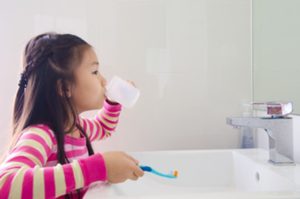
Regular oral hygiene is a pillar of maintaining a healthy and beautiful smile—but this isn’t always so cut-and-dry, and sometimes questions pop up about how to properly care for one’s smile. One question that comes up often is whether or not you’re supposed to rinse your mouth after brushing your teeth: is it better to rinse out all of the excess toothpaste, or is that detrimental to your oral health? Here’s more from your dentist about some of the benefits and risks of this habit.
Is It Okay to Rinse After Brushing My Teeth?
Sadly, there’s no definitive yes or no answer here. Ideally, you want to give the fluoride from your toothpaste the opportunity to sit on your teeth for a few minutes, to fully maximize its potential. Fluoride plays a very crucial role in keeping your teeth healthy. This naturally occurring mineral is found in many of the things you eat, and it’s also often added to tap water sources. It actively re-mineralizes your enamel, which safeguards your teeth from decay. This means that you should want the fluoride from your toothpaste to be in direct contact with your teeth for a few minutes after brushing.
However, if you’re rinsing your mouth immediately after brushing, you’re actually washing away the ingredient that is meant to help you! Even using a mouthwash after brushing can wash away much of the heavily concentrated fluoride from your toothpaste. The U.K.’s Oral Health Foundation recommends that instead of rinsing your mouth after brushing, simply spit out any excess toothpaste or saliva. They also recommend waiting at least 10 minutes before eating or drinking anything.
The Benefits to Rinsing After Brushing
If you still can’t resist the urge to rinse your mouth after brushing, it’s not entirely futile. There are still some benefits to the habit including:
- It emulates your mouth’s natural flow of saliva, which helps to wash away excess bacteria the lingers after brushing.
- It greatly reduces the risk of swallowing toothpaste by accident.
- It lessens the intensity and aftertaste of certain cleaning products.
The Risks of Not Rinsing After Brushing
Though it’s considered safe to forgo rinsing after brushing, you should still be mindful of the side effects linked with ingesting fluoride. Most oral hygiene products contain fluoride levels meant for adults, so a larger risk does exist when children ingest it. However, this small amount is usually harmless—but sometimes symptoms like abdominal pain, nausea, diarrhea, and fluorosis can sometimes occur.
Knowing the pros and cons of rinsing after brushing can help you make an informed decision that prioritizes your oral well-being. If you have any other concerns about rinsing after brushing, your dentist will be able to provide you with additional information and suggestions.
About the Author
Dr. Krunal Patel received his dental doctorate from the prestigious New York University College of Dentistry and has proudly served patients and families in the Spring House area for several years. His practice is pleased to offer a wide range of services including preventive, cosmetic, and restorative options. If you have any questions about the article or would like to arrange a visit, please contact the practice online or over the phone for assistance: (215) 643-5220.


